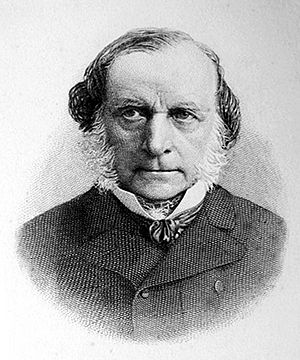Lorenz von Stein facts for kids
Quick facts for kids
Lorenz von Stein
|
|
|---|---|

Lorenz von Stein
|
|
| Born | 18 November 1815 Eckernförde, Schleswig, Denmark
|
| Died | 23 September 1890 (aged 74) |
| Nationality | German |
| Institution | University of Vienna |
| Field | Political economics |
| Alma mater | University of Kiel |
| Other notable students | Carl Menger |
| Influences | Marquis de Condorcet, Benjamin Constant, Robert von Mohl, Charles Fourier, G. W. F. Hegel, Henri de Saint-Simon, Jean de Sismondi |
| Contributions | Welfare state |
Lorenz von Stein (born November 18, 1815 – died September 23, 1890) was an important German thinker. He was an economist, a sociologist, and an expert in public administration. He came from a town called Eckernförde.
He gave advice to Japan during a time of big changes. His ideas about how a government should work helped shape the Constitution of Japan. He also influenced other important thinkers like Rudolf von Gneist.
Stein believed that a liberal state (a government that protects people's freedoms) should also be active in helping its citizens. He thought the government should help create a fair society. He is often called the "intellectual father of the welfare state." A welfare state is a country where the government helps its people with things like healthcare, education, and social support. Stein's ideas also influenced a movement called American progressivism in the United States.
Contents
A Young Thinker's Journey
Lorenz von Stein was born in a seaside town called Borby in Eckernförde, which is in Schleswig-Holstein. His birth name was Wasmer Jacob Lorentz.
He studied philosophy and jurisprudence (the theory of law) at the universities of Kiel and Jena from 1835 to 1839. He also studied in Paris from 1841 to 1842.
From 1846 to 1851, Stein was a professor at the University of Kiel. He took part in the 1848 Revolutions, which were a series of protests across Europe. He even ran for election to the Frankfurt Parliament, a group that tried to create a unified German state.
Stein strongly supported the independence of his home region, the Schleswig, which was then part of Denmark. Because of his strong views, he lost his job in 1852.
Ideas on Social Movements
In 1848, Stein wrote a book called Socialist and Communist Movements since the Third French Revolution (1848). In this book, he introduced the term "social movement" into academic discussions. He used this term to describe political groups that fought for social rights, like the right to welfare.
He continued this theme in 1850 with another book, History of the French Social Movements from 1789 to the Present (1850). For Stein, a social movement was a way for society to influence the state. He believed these movements were caused by economic inequalities. He thought they helped bring the proletariat (working class) into politics through their representatives.
Professor and Advisor
From 1855 until he retired in 1885, Lorenz von Stein was a professor of Political economy at the University of Vienna. His work from this time is seen as the foundation for the international science of public administration. He also had a big impact on how governments manage their money, known as public finance.
In 1882, Itō Hirobumi, who would later become the Prime Minister of Japan, led a group to Europe. Their goal was to study Western government systems. The group first went to Berlin to learn from Rudolf von Gneist. Then they went to Vienna, where Stein was teaching at the University of Vienna.
Both Gneist and Stein advised the Japanese delegation to avoid universal suffrage (where everyone can vote) and party politics. Stein believed that the state was more important than society. He thought the state's purpose was to bring about social reform (improvements in society). He believed these reforms should come from the monarchy (the king or emperor) down to the common people.
Understanding Society and the State
Stein is well-known for applying Hegel's dialectic (a way of understanding ideas through opposing forces) to public administration and the national economy. He used this method to improve how these subjects were studied, while also looking at their history.
Stein studied the "class state" of his time and compared it to the "welfare state." He developed an economic way of looking at history that included ideas like the proletariat and class struggle. However, he, like many middle-class liberals, feared violent revolution. Instead, he supported solutions through reform.
He focused on the "Social Question." This was the problem that industrial workers in a capitalist country often could not earn enough to buy property or build wealth. Stein believed this problem should be solved through a program of welfare and social administration. This program would be based on the liberal idea of giving everyone free and equal chances.
Even though some of his ideas were similar to those of Marxism, it's not clear how much Stein influenced Karl Marx. However, Marx did mention Stein in some of his writings, showing he knew about Stein's influential 1842 book on communist ideas in France.
Lorenz von Stein passed away at his home in Vienna on September 23, 1890.
See also
 In Spanish: Lorenz von Stein para niños
In Spanish: Lorenz von Stein para niños
 | Delilah Pierce |
 | Gordon Parks |
 | Augusta Savage |
 | Charles Ethan Porter |

